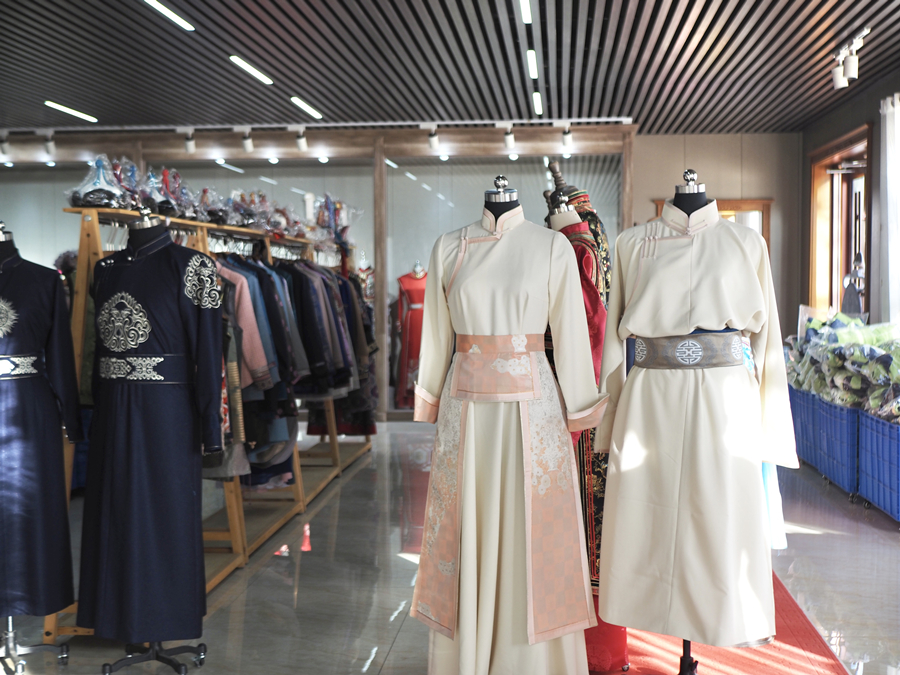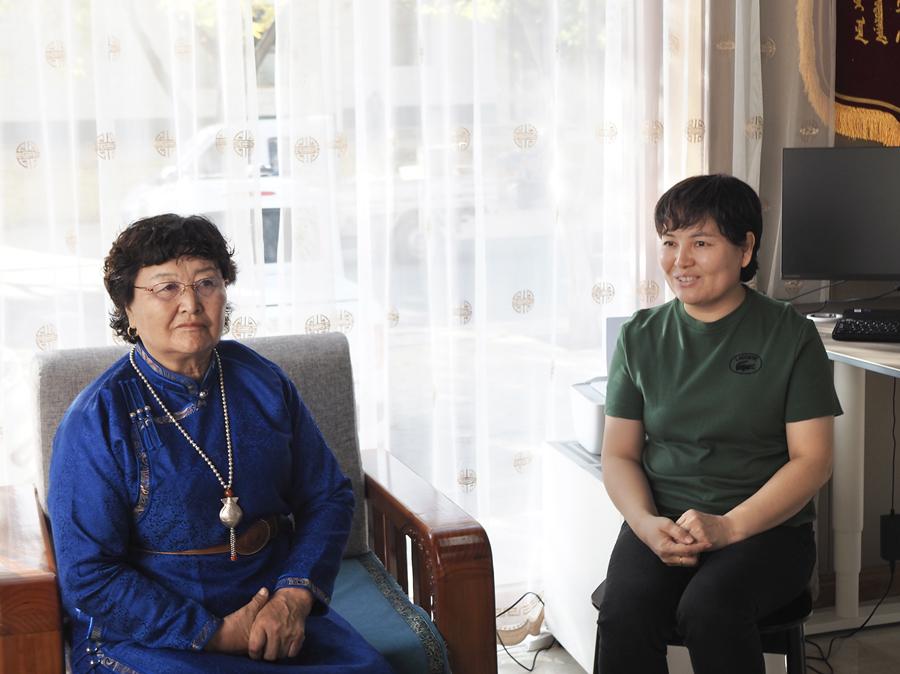
 0 Comment(s)
0 Comment(s) Print
Print E-mail China.org.cn, November 17, 2024
E-mail China.org.cn, November 17, 2024
The rich heritage of Mongolian ethnic costumes in Ordos, a city of north China's Inner Mongolia autonomous region, stands as a precious intangible cultural legacy that illuminates the traditions of the Mongolian ethnic group. Behind these stunning and expertly crafted garments lie the artistry of generations who have woven each thread by hand.

Mongolian ethnic costumes on display in Meng Genhua's workshop, Inner Mongolia, China, Nov. 8, 2024. [Photo by Liao Jiaxin/China.org.cn]
Among them, Meng Genhua from Otog Front Banner, a district of Ordos, has emerged as a renowned local ethnic costume designer, becoming a familiar name throughout her community.
Journalists visited Meng's workshop on Nov. 7, eager to understand her deep connection to this cherished cultural heritage.
Inside her workshop, an array of ethnic costumes catches the eye. The garments range from magnificent to understated, each exuding a strong local character. From exquisite patterns to unique buttons, every detail embodies meticulous craftsmanship and ingenuity.
Mongolian ethnic costumes on display in Meng Genhua's workshop, Inner Mongolia, China, Nov. 8, 2024. [Photo by Liao Jiaxin/China.org.cn]
Meng, now 68, grew up in a modest herdsman's family. Reflecting on her journey in ethnic costume making, she credited her passion to the early influence of her parents, both tailors. Her fascination with Mongolian attire began in her teens when she learned the craft that would shape her future. The path aligned naturally with her cultural heritage.
Meng's dream of starting a costume business materialized in 1985 with the opening of a small clothing workshop. Faced with initial challenges, such as limited customers and funds, she offered her creations at low prices. Her exceptional craftsmanship soon drew a growing clientele. As her reputation grew, she became a leading ethnic costume designer in the region. Gradually, she also took on the role of promoting and preserving the rich heritage of Ordos Mongolian costume culture.
Determined to revive the "zhuge" — an elaborate Mongolian headdress nearly lost to time — Meng consulted over a dozen local artisans. Her decade-long dedication paid off in 1995 when she successfully recreated the traditional craft, sparking regional enthusiasm.
Meng Genhua shows and introduces the "zhuge," Inner Mongolia, China, Nov. 8, 2024. [Photo by Liao Jiaxin/China.org.cn]
Meng earned recognition in 2012 as a representative inheritor of Ordos' intangible cultural heritage. She began offering free annual training in clothing design, tailoring and handicraft skills to laid-off workers and rural migrants, helping develop more than 100 skilled female artisans.
Understanding that cultural preservation must evolve with the times, Meng has visited many places to study contemporary fashion trends. She skillfully integrates Ethnic Mongolian design elements into modern apparel, bridging traditional motifs with contemporary aesthetic preferences.
Her passion for ethnic costumes has inspired her daughter Sarula, who transitioned from art teaching to sharing her design expertise at Otog Front Banner Vocational High School in 2017. "Growing up, I was always taught to use the sewing machine by my mother's side," Sarula recalled. "Her love for our cultural garments deeply inspired my own."

Meng Genhua and her daughter Sarula talk about their experiences and insights on promoting ethnic costumes, Inner Mongolia, China, Nov. 8, 2024. [Photo by Liao Jiaxin/China.org.cn]
With a hopeful smile, Sarula added, "Looking ahead, I aim to innovate further, creating designs that accommodate diverse body types."
Today, Meng continues her devoted pursuit of sharing and preserving the mesmerizing art of Mongolian ethnic costumes, inspiring not only the people of Ordos but also aspiring designers to cherish and perpetuate this unique aspect of China's ethnic Mongolian cultural heritage.